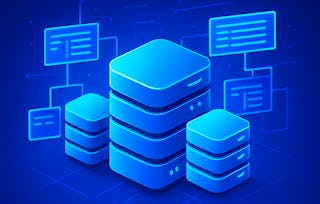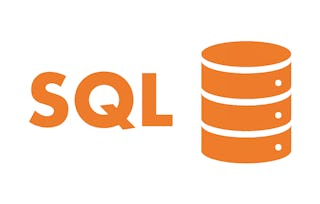Dans Gestion des bases de données relationnelles, vous découvrirez leur structure, leur conception et l'utilisation des champs de clés primaires et étrangères vous dotant ainsi de connaissances fondamentales.

Gestion des bases de données relationnelles

Gestion des bases de données relationnelles
Ce cours fait partie de plusieurs programmes.

Instructeur : Shadow Farrell
Enseignant de premier plan
2 891 déjà inscrits
Inclus avec
31 avis
Expérience recommandée
Ce que vous apprendrez
Les étudiants apprendront à créer et à gérer des bases de données relationnelles et à utiliser le langage SQL pour l'analyse des données et l'établissement de rapports.
Compétences que vous acquerrez
- Catégorie : Théorie des bases de données
- Catégorie : SQL
- Catégorie : Conception de la base de données
- Catégorie : Bases de données relationnelles
- Catégorie : Langage de requête
- Catégorie : Analyse des Données
- Catégorie : Manipulation de données
- Catégorie : Systèmes de base de données
- Catégorie : Gestion des bases de données
- Section Compétences masquée. Affichage de 7 compétence(s) sur 9.
Détails à connaître

Ajouter à votre profil LinkedIn
Découvrez comment les employés des entreprises prestigieuses maîtrisent des compétences recherchées

Élaborez votre expertise du sujet
- Apprenez de nouveaux concepts auprès d'experts du secteur
- Acquérez une compréhension de base d'un sujet ou d'un outil
- Développez des compétences professionnelles avec des projets pratiques
- Obtenez un certificat professionnel partageable auprès de Akamai Technologies, Inc.

Il y a 7 modules dans ce cours
Dans ce module, vous découvrirez les concepts des bases de données et des bases de données relationnelles. Vous explorerez la structure d'une base de données relationnelle et SQL, le langage utilisé pour gérer les bases de données relationnelles. Vous maîtriserez ensuite les compétences nécessaires pour créer des requêtes à l'aide de l'instruction SELECT, y compris les requêtes conditionnelles, les opérations logiques, les opérateurs de comparaison et les opérateurs arithmétiques. Enfin, vous explorerez des critères plus complexes qui peuvent être utilisés pour rechercher des plages et des motifs.
Inclus
12 vidéos6 lectures3 devoirs1 sujet de discussion
Dans ce module, vous apprendrez à créer des requêtes avec des critères multiples en utilisant les mots clés AND et OR. Vous apprendrez également à créer des requêtes à l'aide de critères plus complexes impliquant des opérateurs de comparaison et arithmétiques, la recherche de plages de valeurs, la gestion des valeurs NULL et, enfin, l'incorporation de la recherche de motifs et d'expressions régulières.
Inclus
9 vidéos2 lectures3 devoirs
Dans ce module, vous découvrirez les fonctions et les types de données de date et d'heure. Vous apprendrez à utiliser les fonctions de date et d'agrégation pour extraire et analyser des données. Vous apprendrez également à formater les dates, les chaînes de caractères et les nombres afin qu'ils puissent être utilisés pour la création de rapports et l'analyse.
Inclus
7 vidéos7 lectures4 devoirs
Dans ce module, vous apprendrez à combiner plusieurs requêtes en utilisant UNION, INTERSECT et EXCEPT. Vous apprendrez ensuite à combiner des données provenant de plusieurs tables à l'aide de jointures. Vous apprendrez les quatre types de jointures et explorerez ensuite leur utilisation avec plusieurs tables et pour les jointures automatiques. Enfin, vous organiserez les données à l'aide de ORDER BY, GROUP BY et ROLLUP.
Inclus
10 vidéos3 lectures4 devoirs
Dans ce module, vous apprendrez à utiliser les sous-requêtes, qui sont des requêtes contenues dans d'autres requêtes. Vous apprendrez comment et quand utiliser les sous-requêtes dans les clauses WHERE et FROM. Vous découvrirez également les sous-requêtes corrélées et les sous-requêtes utilisées pour tester l'existence d'enregistrements. Enfin, vous apprendrez à créer des sous-requêtes imbriquées pour les situations où une seule sous-requête ne suffit pas à obtenir les données dont vous avez besoin.
Inclus
7 vidéos1 lecture3 devoirs
Dans ce module, vous apprendrez à créer des bases de données, des tables et des champs. Vous apprendrez à insérer de nouveaux enregistrements, à mettre à jour les enregistrements existants et à supprimer les enregistrements devenus inutiles.
Inclus
7 vidéos2 lectures3 devoirs
Dans ce module, vous démontrerez que vous maîtrisez les objectifs du cours.
Inclus
2 vidéos1 évaluation par les pairs
Obtenez un certificat professionnel
Ajoutez ce titre à votre profil LinkedIn, à votre curriculum vitae ou à votre CV. Partagez-le sur les médias sociaux et dans votre évaluation des performances.
Instructeur

Offert par
En savoir plus sur Gestion des données

Birla Institute of Technology & Science, Pilani
 Statut : Essai gratuit
Statut : Essai gratuit Statut : Prévisualisation
Statut : PrévisualisationUniversitat Politècnica de València
Pour quelles raisons les étudiants sur Coursera nous choisissent-ils pour leur carrière ?

Felipe M.

Jennifer J.

Larry W.

Chaitanya A.
Avis des étudiants
- 5 stars
87,09 %
- 4 stars
6,45 %
- 3 stars
3,22 %
- 2 stars
0 %
- 1 star
3,22 %
Affichage de 3 sur 31
Révisé le 3 sept. 2024
The way of teaching makes the learner very comfortable to grasp the technology with ease.

Ouvrez de nouvelles portes avec Coursera Plus
Accès illimité à 10,000+ cours de niveau international, projets pratiques et programmes de certification prêts à l'emploi - tous inclus dans votre abonnement.
Faites progresser votre carrière avec un diplôme en ligne
Obtenez un diplôme auprès d’universités de renommée mondiale - 100 % en ligne
Rejoignez plus de 3 400 entreprises mondiales qui ont choisi Coursera pour les affaires
Améliorez les compétences de vos employés pour exceller dans l’économie numérique
Foire Aux Questions
Pour accéder aux supports de cours, aux devoirs et pour obtenir un certificat, vous devez acheter l'expérience de certificat lorsque vous vous inscrivez à un cours. Vous pouvez essayer un essai gratuit ou demander une aide financière. Le cours peut proposer l'option "Cours complet, pas de certificat". Cette option vous permet de consulter tous les supports de cours, de soumettre les évaluations requises et d'obtenir une note finale. Cela signifie également que vous ne pourrez pas acheter un certificat d'expérience.
Lorsque vous vous inscrivez au cours, vous avez accès à tous les cours du certificat et vous obtenez un certificat lorsque vous terminez le travail. Votre certificat électronique sera ajouté à votre page Réalisations - à partir de là, vous pouvez imprimer votre certificat ou l'ajouter à votre profil LinkedIn.
Plus de questions
Aide financière disponible,
¹ Certains travaux de ce cours sont notés par l'IA. Pour ces travaux, vos Données internes seront utilisées conformément à Notification de confidentialité de Coursera.


